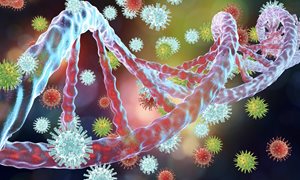
People with HIV often suffer from additional health conditions. An international team of researchers extensively studied the health status of 1,300 people with HIV and identified molecules and mechanisms that may explain these additional illnesses. The results were published in Nature Medicine and made publicly available - in the hope they will contribute to new therapies.
It was already known that people with HIV who are treated with antiretrovirals often develop conditions such as cardiovascular disease, liver disease, or cancer. 'They more frequently experience chronic inflammation in the body, which accelerates aging and can result in a lower life expectancy than others', says Yang Li of the German Center for Personalized Infectious Medicine (CiiM). Researchers from institutions including CiiM and Radboudumc wanted to identify the underlying factors using a big data study.
The study was based on a large Dutch dataset of 1,300 people with HIV, collected as part of the 2000HIV Study. 'This massive data set, which includes genetic, protein, and metabolite data, gave us unique insights at various molecular biological levels', says Javier Botey-Bataller of CiiM and Radboudumc. The team also analyzed another crucial molecular level – how the immune system responds to different stimuli. This reflects how well the immune system can fend off certain pathogens.
Inflammation
The researchers linked the data to the existing conditions of the participants, including cardiovascular disease, carotid artery atherosclerosis, and chronic lung disease COPD. Subsequently, they looked for molecular abnormalities, for example in genes or biological signaling pathways. 'We were truly able to uncover a whole range of previously hidden molecular patterns and players associated with these conditions', says Botey-Bataller.
They also identified molecules that can predict the strength of an immune response. 'An excessive immune response can lead to inflammation, which is the main cause of diseases in people with HIV. Therefore, the severity of inflammation is very important', says André van der Ven, Professor of International Health at Radboudumc. 'With our study, we were able to create a molecular map on which future research can be based – for example, to further investigate the role of specific genes or proteins.'
More Sensitive
During their research, the scientists made another interesting discovery: they found that a particular variant of the NLRP12 gene, which regulates inflammatory processes in cells, is responsible for exceptionally high levels of inflammation. This applies not only to people with HIV, but also to a control group without HIV. People with this genetic variant thus appear to be more sensitive to high levels of inflammation and related diseases.
This study is a collaboration between CiiM, Radboudumc, OLVG, Erasmus MC, and ETZ. CiiM is a joint institution of the Helmholtz Centre for Infection Research and the Hannover Medical School. The data and analysis results from the study are available online and can be used for further research. The researchers hope their findings will provide starting points for the development of new therapies.
About the publication
This research was published in Nature Medicine: Genetic and molecular landscape of comorbidities in people living with HIV. Javier Botey-Bataller, Nienke van Unen, Marc Blaauw, Willem A.J.W. Vos, Louise van Eekeren, Nadira Vadaq, Vasiliki Matzaraki, Annelies Verbon, Albert L. Groenendijk, Jéssica C. dos Santos, Maartje C. P. Cleophas, Janneke E. Stalenhoef, Marvin A.H. Berrevoets, Xun Jiang, Manoj K. Gupta, Nhan Nguyen, Cheng-Jian Xu, Leo A.B. Joosten, Mihai G. Netea, André J.A.M. van der Ven, Yang Li. DOI: 10.1038/s41591-025-03887-1.
-
Want to know more about these subjects? Click on the buttons below for more news.
Related news items

Nijmegen researchers find new genetic cause bubble boy disease SCID Genetic new born screening SCID can be further refined
19 March 2024Researchers from Nijmegen and Newcastle discovered a new genetic mutation leading to severe combined immune deficiency disorder (SCID). It’s the first time a mutation in the proteasome, a molecular shredder, has been linked to this serious disease.
go to page




